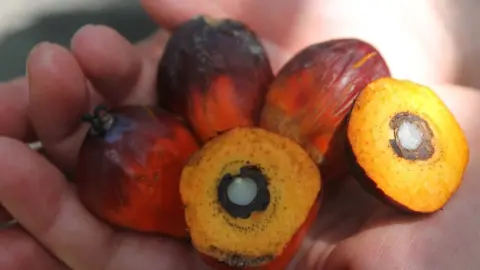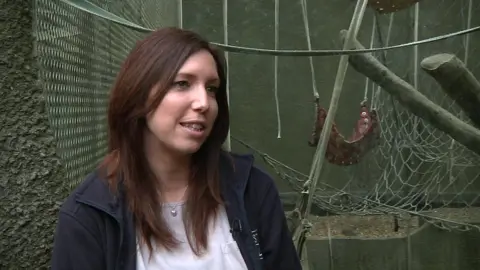Chester in Palm Oil City move to save orangutan homes
 BBC
BBCChester has been named a Sustainable Palm Oil City following a campaign led by its zoo.
More than 50 local organisations, including restaurants and the city's university, have committed to changing the way they buy palm oil.
Conservationists say unsustainable oil palm plantations threaten the existence of species such as orangutans.
City of Chester MP Chris Matheson said he hoped other cities around the world would now follow its lead.
The zoo's conservationists developed the Sustainable Palm Oil City model based on criteria used in the Sustainable Fish Cities project led by the environmental group Sustain.
The new model has been endorsed by conservation organisations including the British and Irish Association of Zoos and Aquariums.
As the originator of the scheme, Chester has become the first city to adopt Sustainable Palm Oil City status.
 Chester Zoo
Chester Zoo"This is fabulous news for the zoo, fabulous news for Chester and fabulous news for the planet," MP Mr Matheson said.
Palm oil is believed to be the most widely-used vegetable oil on the planet, present in about 50% of the products found in supermarkets and shops.
Growing demand in recent decades has seen thousands of hectares of established tropical forest across South East Asia cleared to make way for new plantations.
Orangutans, tigers, pygmy elephants and other species living in the forest have been affected.

"But it is not too late. By embracing a more sustainable future, we can stop the crisis," said Cat Barton from Chester Zoo.
"This is a major moment in the fight to save orangutans and other wildlife from extinction," she said.
"More cities are now engaging in talks to follow this model and major companies nationwide are working with us to make the switch to sustainable palm oil."
Jason Ellison, owner of Chez Jules, the first restaurant in Chester to commit to the project, said he visited Malaysia and Borneo in 2008 and was "appalled to see the acrid smoke" caused by rainforest being burnt to clear land for oil palm plantations.
 Marc Ancrenaz
Marc AncrenazAfter committing to use only sustainable palm oil in future, he realised "so many products" did.
"Whether it's biscuits or cake products, certain ingredients, and hand soaps, all these different things which you think would never contain palm oil but they do.
"The problem for suppliers was that they didn't really understand it either, so it was very much an education process that we worked with suppliers on," Mr Ellison said.
In 2018, the University of Chester joined the campaign after its catering team worked with suppliers to ensure the palm oil in its products was sustainable.
In February, however, research by the BBC suggested that not all supermarket products sold as containing "100% certified sustainable" palm oil could be traced to their source.
You can see more on this story on BBC Inside Out North West on BBC One at 20:30 GMT on Monday 11 March and for 28 days afterwards on the BBC iPlayer.
